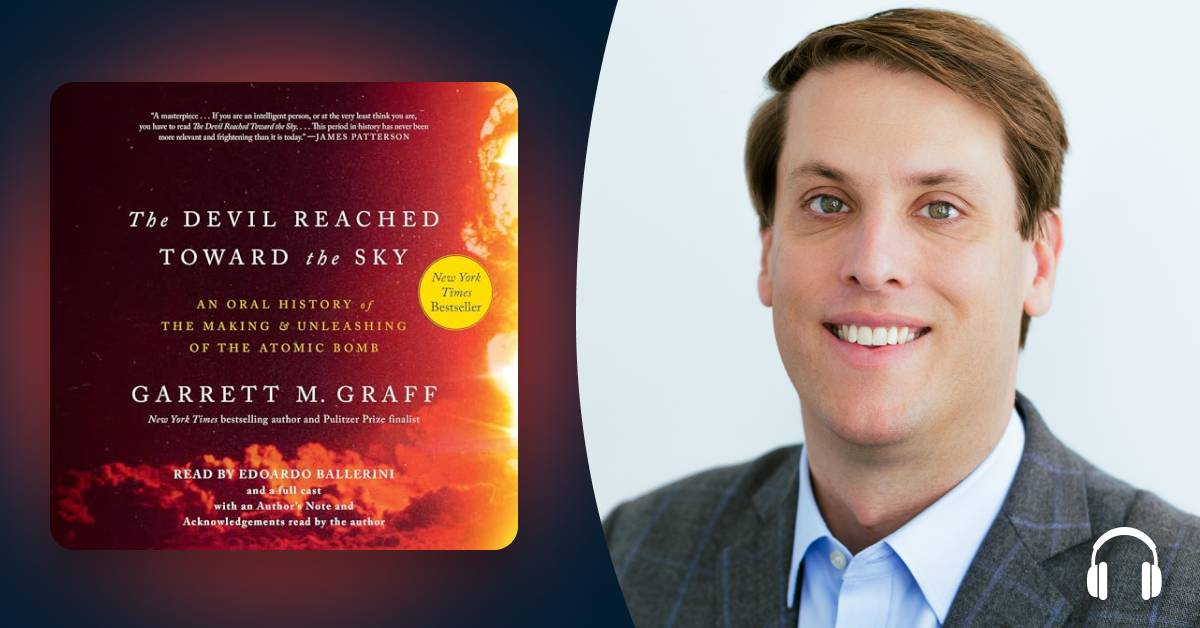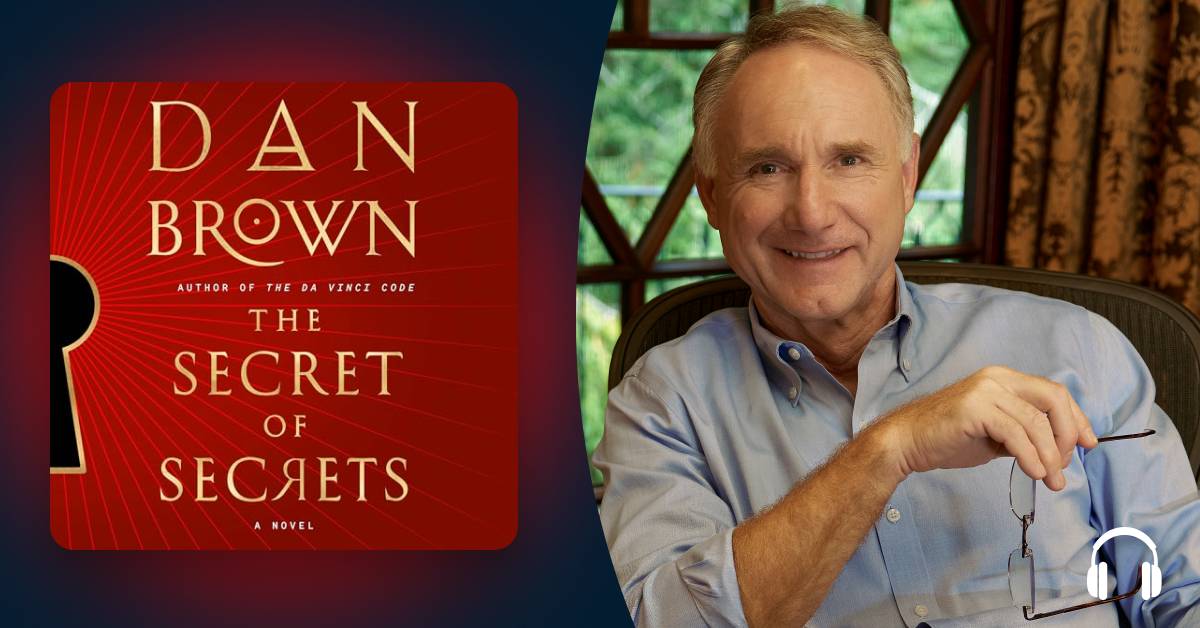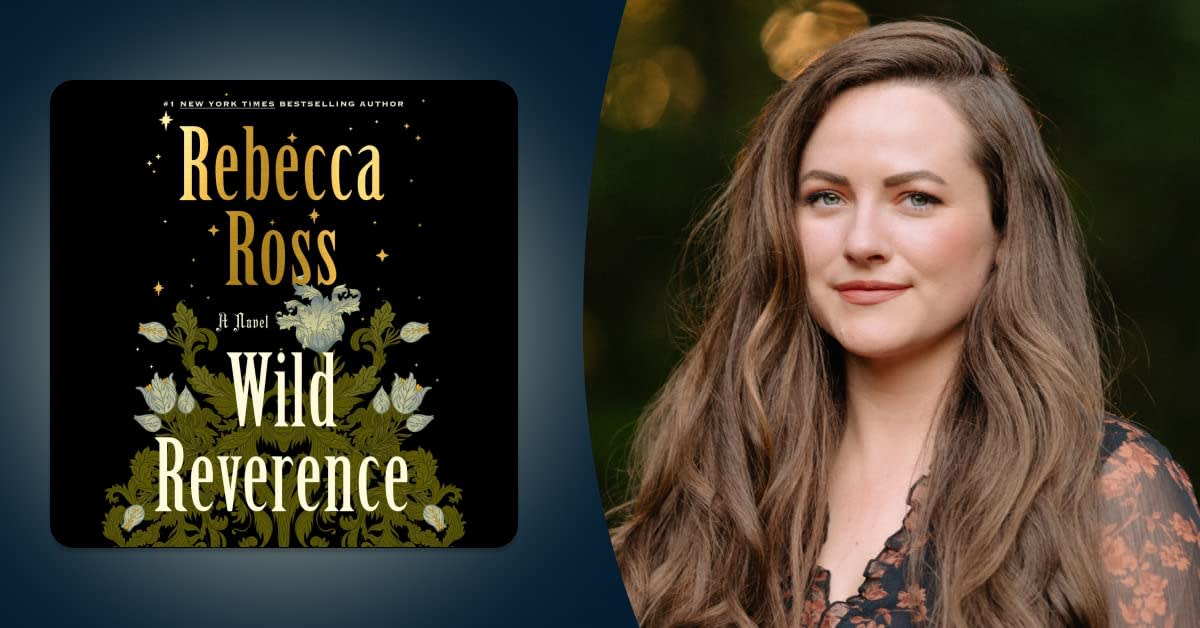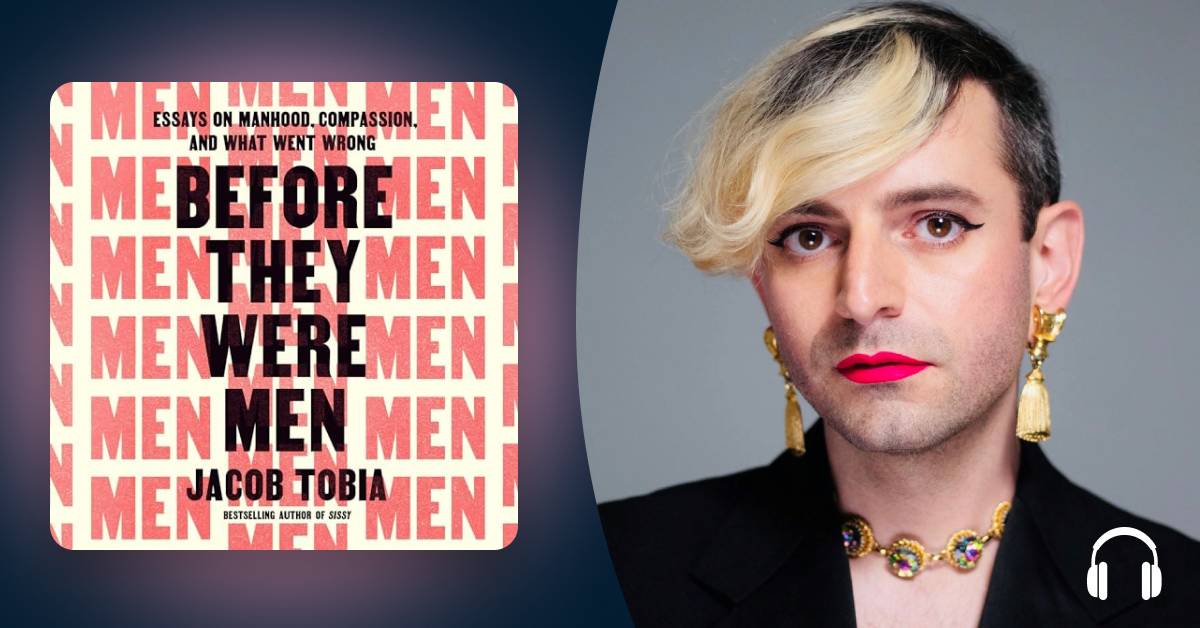Note: Text has been lightly edited for clarity and does not match audio exactly.
Katie O'Connor: Hi, listeners. I'm Audible editor Katie O'Connor, and today I'm speaking with journalist, historian, and Pulitzer Prize finalist Garrett Graff about his latest oral history, The Devil Reached Toward the Sky, which explores the making and unleashing of the atomic bomb timed to the 80th anniversary of the bombings of Nagasaki and Hiroshima. Welcome, Garrett.
Garrett M. Graff: Thanks so much for having me.
KO: Thank you for being here. And, again, congratulations on another truly stunning book. You are the author of, is it 11 books now?
GG: Thereabouts, yeah.
KO: Thereabouts, roughly. Including three intricate and really compelling oral histories. The Only Plane in the Sky: An Oral History of 9/11, When the Sea Came Alive: An Oral History of D-Day, and of course, your most recent work, The Devil Reached Toward the Sky. Why do you think this is such an effective way to share history?
GG: Yeah, so I think oral history has a special power that enables you to go back and experience events through the eyes of the people who lived them at a moment when they didn't understand the events and what the outcome was going to be. And what I mean by that is my 9/11 book, The Only Plane in the Sky, came out in 2019, which was the 18th anniversary of 9/11. And it was a moment when those events were beginning to slip from living memory into history. You had the first American servicemen and women going through basic training and deploying to fight in Iraq and Afghanistan in wars that had begun before they were born. You had the first eligible recruits trying to enter the fire department of New York, who were born after that day that killed 343 members of the fire service.
And the 9/11 that those people had learned about in history books is this version that begins at 8:46 in the morning. The whole thing is over 102 minutes later at 10:28 with the collapse of the second tower. There are four planes, four attacks, and 3,000 people die. And that is absolutely a factually true summary of 9/11. But if you were alive on 9/11, that's not the day that any of us actually remembered living. The day that we remember, we didn't know when it began; we didn't know when it was over; we didn't know how many attacks there had been; we didn't know how many hijacked planes there were; we didn't know how many people were dead; and we didn't know what came next. We didn't know what would be coming that afternoon or on September 12th, or in October, or in 2002.
And so, if you only learn about 9/11 in history books, you learn a version that is neater, cleaner, simpler, and more preordained than the version that any of us actually lived, and you miss the fear, the chaos, the confusion, and the trauma that it was to live. So, fast-forward a few decades, and we are marking these 80th anniversaries of World War II. And to me, these 80th anniversaries I think feel especially poignant because they are also the unofficial marking of the passing of the last of that Greatest Generation. The people who won the war here in the United States, the people—in the case of the atomic bomb—who survived the bombing of Hiroshima and Nagasaki, the Hibakusha. And we have at this moment, sort of effectively, every first-person memory we will ever have of World War II.
So, my goal with these two other oral histories—on D-Day last year and on the Manhattan Project and the atomic bomb this year—is to capture the other end of that arc of history. That for a generation who will never know the events of World War II as living memory and for us—at a moment where it will be, you know, in the next couple of years become permanent history—to try to tell those stories of those grand epochal world events in the footsteps of the people who didn't know the outcome. And so, this Manhattan Project history is: What was it like to work on the Manhattan Project at a moment where you didn't know who was going to win World War II? You didn't know whether Adolf Hitler was going to get the atomic bomb first, and you didn't even know whether an atomic bomb would work.
And that these events I think end up—both D-Day and the Manhattan Project—seeming to be such great triumphs, in retrospect. But that's not what anyone felt as they went through them at the time. You know, when you hear from the Army soldiers in the landing craft, crossing the English Channel on the night of June 5th; when you hear the memories of the paratroopers crossing the English Channel to, you know, parachute down into the Normandy hedgerows, they don't know that they're going to be part of a historic world-changing triumph.
"What was it like to work on the Manhattan Project at a moment where you didn't know who was going to win World War II?"
KO: Right. Which I think this is a good segue to my next question, which is: You just mentioned that When the Sea Came Alive came out last June timed to the 80th anniversary of D-Day. Of course, as we've mentioned, The Devil Reached Toward the Sky is timed to the 80th anniversary of the bombings of Hiroshima and Nagasaki. These two works certainly feel like companions to me, and I'd have to imagine that you were working on them at the same time. Did this start as one overarching World War II history, or were you always envisioning them as two separate entities focusing on these two very distinct moments?
GG: That is actually a fascinating question, and it's the first time anyone, I think including my agent, has ever actually asked that. And I actually did, at one point, envision sort of a grand overarching oral history of World War II.
It started as really just the story of D-Day, in its actual form. And then, sort of D-Day proved successful enough as a book concept that we decided to do the Manhattan Project, as well. And they fit together in really weird ways that, you know, on the one hand they do feel like one book about Europe, one book about the Pacific. But there's also a weird connection between the two that I've really only come to understand after finishing them, when you read them together or listen to them together. This is the birth, in these two books, of the myth of postwar America. That D-Day is really this book about the moment that America stepped up to defend democracy and to sort of secure, you know, freedom and democracy in the 20th Century. And the Manhattan Project is the story of how we created the model for a successful country after the war. The sort of model for science and research and technology and educational achievement in higher ed that really allowed us to be the economic superpower and hegemon of the second half of the 20th Century.
And there's like a weird way that I think, in both of these books, you see this transition that takes place during World War II, where Britain begins the war as sort of the most powerful country in the world. Sort of the leader of the world, if there is such a thing. And then the US brings to bear its massive industrial might and, building landing craft and the atomic bomb and then, at the end of the war, America sort of stands alone as the unparalleled leader of the free world and economic superpower.
"I'm a Vermonter, and so I talk about oral history as if it's like making maple syrup."
KO: The research that you have done for all three of your oral histories is mind-boggling, and the way that you weave everything together, truly it's art in and of itself. Where do you even begin when you are starting one of these oral histories?
GG: Yeah. I'm a Vermonter, and so I talk about oral history as if it's like making maple syrup. You start with 40 gallons of maple sap, and then you boil it for hours and hours, and you end up with one gallon of maple syrup. Oral history is, in some ways, the opposite of normal writing because it's entirely subtractive rather than additive. And so, I spend months going through all manner of research and primary sources: memoirs, oral histories, transcripts, news articles. You know, the atom bomb book pulled a lot from Nobel Prize lectures, which is not a primary source I have used a lot before. You know, letters in archives; for this new one, I dug into archives in three continents: in Europe and Japan, and here in the United States. The National WWII Museum has this incredible trove of oral histories.
I sort of highlight and collect every single quote that seems relevant or interesting. And then I sit down, and for both the D-Day book and The Devil Reached Toward the Sky, I started with a manuscript that was sort of in the neighborhood of about 1.4 million words.
KO: Wow.
GG: So that's, like, 3,500, 4,000 pages. And then, you know, I just sit there every day for months in the sort of maple sap boiling process and delete, delete, delete, delete, delete. In a good day of writing, I can write 2,000, 2,500 words. And in a good day of oral history editing, I can cut 25,000 words.
KO: Wow.
GG: I use a program called Scrivener that is a sort of academic writing database program, and I think in the atom bomb book, it was, you know, something like 100, 130 different files with different types of quotes about different subjects, and then I just sort of start weaving them together and deleting duplicative ones and editing them down. And it, you know, just ends up being this, like, really amazing and really fun puzzle to get all of these pieces into the right order.
KO: I love that. A process of subtraction.
GG: Yes.
KO: That's amazing. Well, as in all of your oral histories, you include the perspectives of so many people. And in The Devil Reached Toward the Sky, I believe you said it is around 500 different voices: soldiers, leaders, journalists. I mean, everyone from child survivors of the bombings to the scientists who made it. And history can sometimes feel so distant—which you were sort of touching on at the top—but your approach really does make it deeply human. How do you decide who to include?
GG: Mm. Um, so it's a great question because one of the funny things about oral history is it doesn't necessarily end up being all of the most important people.
Because, what you're looking for are people who can talk sort of plainly and clearly and smartly about events. I think what was very, particularly challenging about that for this project was, there's this huge overlay to the Manhattan Project about science, about, you know, how atoms work and how we discovered nuclear fission and how you build an atomic bomb. And warning to readers or listeners: You don't actually really need to understand it in order to follow the book. So it's okay if all of this stuff about neutrons goes over your head, it certainly went over mine for a long period of the research.
But scientists are not actually very good at explaining, in plain terms, the science that they are talking about or discovering. Albert Einstein turns out to be, like, basically the last person in the world you want to explain Einstein's theory of relativity to you. And so, you know, I really struggled with this project to find people who could explain some of these concepts really well, in terms that would be understandable to someone who is not in a PhD seminar about nuclear physics. I had a friend once describe these oral histories as a symphony of small voices, which is a phrase that I really love because you're absolutely right that, I think, in any of these books, 9/11, D-Day, or the Manhattan Project, you'll finish them and the characters and the people that you remember are not going to be the names of any of the really famous people along the way.
Part of what was really interesting to me about this book and project, and the way that I really tried to put it together, was I think in our histories of the Manhattan Project, we oversimplify and over-romanticize the version that focuses on J. Robert Oppenheimer and his band of merry physicists on a mesa in Los Alamos. Oppenheimer was a great movie. I actually came away from this even more impressed with the historical accuracy of that movie for the most part. But what you come to understand in looking at the Manhattan Project is that the strength of the project is in the industrial might that we bring to bear on the project.
It is the creation of these secret cities in Oak Ridge, Tennessee, and Hanford, Washington, where, you know, this is remote mountain valleys in Tennessee, orchards and literal desert in eastern Washington State where, over the course of, like, two-and-a-half years, an incredibly short period of time, the government seizes the land, builds these facilities that are, like, 50-miles-wide, by 50-miles-long,
KO: Massive.
GG: That employ and house 100,000 people a piece and build these factories that are, like, multiple football fields large in order to refine and process uranium in Oak Ridge and plutonium in Hanford, Washington. Plutonium, which does not exist at the start of the war in anything other than microscopic elements. It has never been glimpsed by the human eye at the start of World War II. And scientists at the University of Chicago are beginning to sketch out factories where they're going to make this on the order of kilograms. Like it, like these are incredible efforts!
To put this in scale for people: On August 6th, 1945—the day that the bomb drops on Hiroshima, the day that the Manhattan Project's existence is announced to the world for the first time—the bus system serving Oak Ridge, Tennessee, is one of the 10 largest public transit systems in the United States. And it serves a city that no one knows exists and that doesn't appear on any public map.
I mean, like the scale of this. And so, to me, like, when you ask about the voices, like the amazing voices are the high school girls in eastern Tennessee who end up running the uranium calutrons to process the uranium. And one of my favorite characters is the guy at Hanford, Washington, who is in charge of the box lunches in the cafeteria that serves, you know, like, thousands and thousands of people a day. You know, just like all of these people that you really come to understand—this is how we win World War II.
KO: Yeah. And there's a little girl who, just going back to Einstein, I think she's just mentioned only briefly, but when they're looking for Einstein to write a letter to the president, and they can't find him, and a little girl's like, "I don't know any Albert Einstein, but there's a nice old man with crazy white hair down the street that sounds like that." I'm like, that's amazing!
GG: Yeah.
"I say to anyone who is at all an audiobook fan that listening to these books as audiobooks is the way to go because it is where you really see the tapestry of voices who bring these events to life."
KO: Uh, but speaking of all of these voices you've included, this is brought to life by an incredible full cast in audio, anchored by Edoardo Ballerini. Plus there's, you know, even some archival recording that's in there. How involved are you in the recording process and what is it like to have your oral history realized in sort of its intended way?
GG: Yeah. All three of these oral histories have been put together by the same producer and director, Scott Sherratt, who is, you know, I think like the Monet of audiobooks. He's just this incredible producer and director. And just to brag for a minute, Only Plane in the Sky won the Audie for best audiobook of the year; the D-Day book last year won the Audie for best multi-voice of the year. And they're just these incredible, rich listening experiences. I say to anyone who is at all an audiobook fan that listening to these books as audiobooks is the way to go because it is where you really see the tapestry of voices who bring these events to life.
The Only Plane in the Sky actually included original recordings from the air traffic control on 9/11. We got some of the people who participated in that day to record their own parts, including the White House Chief of Staff, Andy Card. The D-Day book is, you know, this incredible mix of accents that sort of really underscores, you know, what being part of the Allied force in Europe really meant. Go listen to it for the Winston Churchill character alone.
And then, what I just love about The Devil Reached Toward the Sky is you really feel like this whole story comes together because of this group of ragtag, mostly Jewish, refugee scientists fleeing the enveloping cloak of Hitler's fascism in Europe and coming to the United States and where they spend years. You know, 1939, 1940, 1941, like banging on every door that they can in the US government and the military, and saying, like, "Hey, there's this thing called an atomic bomb. Uh, you don't want Hitler to get it first. Hitler's working on this. We know Werner Heisenberg, and our old colleagues who are building this bomb back in Germany, and you want to build this bomb first, like, please get going on this."
KO: Yeah.
GG: And you get in those opening chapters of the book, like, just these amazing accents. You see the Germans and the Hungarians and the Polish scientists and the Austrians and the—
KO: The Italians.
GG: The Italians, yes, yes, yes. Enrico Fermi and his wife Laura. It just made it all feel so much more real to me to listen to it. I have very little to do with the actual audiobook process, which is why I feel so comfortable bragging about it because it's not my own work. I mean, Scott just pulled together an amazing team, and I think they're just incredible gems to listen to.
KO: Yeah. I would echo that. All three are just spectacular in this format. I've enjoyed two of them in both ways actually, in print and audio and it is fun, too, to kind of have both experiences. It's interesting what you were just saying about, you know, these scientists that came to America kind of desperately trying to knock down any government door that they can, and the parallel being drawn that education was so much more tied to government in Europe that they didn't have this problem.
GG: Yes.
KO: There was just this seamless integration that didn't exist over here and, and how hard they fought to get noticed and have the seriousness of the message be conveyed and the urgency there too. I mean, it feels almost prescient to be releasing a book about the making of the atomic bomb right now. What do you hope listeners, our modern-day listeners, take away from The Devil Reached Toward the Sky?
GG: A big part of this story, particularly in the first half of the book, is the development of that relationship between government and science. That when these scientists arrive on the shores of the United States in the late 1930s, early 1940s, the United States does not view science and technology as a core source of national strength. And one of the points that I make in the book is that we spend so much time in history talking about the places where World War II was fought: Bastogne, Omaha Beach, Guadalcanal, El Alamein, Leyte Gulf, Okinawa.
But when you get into the history of World War II, what you understand is that where World War II was won was in the bomber factories of the Ford Motor Company in Willow Run, Michigan. It was won in the shipyards and landing craft factories of Higgins Industry in New Orleans. And it was won in the labs at MIT, the Rad Lab at MIT, and the labs and factories of the Manhattan Project where these creations—like radar and the proximity fuse and, ultimately, the atomic bomb—change the whole outcome of the war because of the way that we are able to outbuild, outproduce, and out invent the Axis powers of Germany and Japan.
And at the end of it, as we were talking about a few minutes ago, you end up with this new model where the government is very tightly tied into the emerging frontiers of science. You have the creation of things like the National Science Foundation, eventually, DARPA. You have institutions like the National Institutes of Health become huge grantmakers after the war to fund science and medical research. And it's that model that is the thing that lets the US thrive in this most unparalleled period of economic prosperity, safety, and security that humans have ever had in the 80 years after World War II.
The world becomes healthier and it becomes safer, and it becomes, you know, advanced in ways that would have been, literally, unimaginable. From electric vehicles to space travel to, you know, the invention of the internet, all of which is sort of underpinned by government-supported science and research.
And it really does worry me that we, sort of, right here at this precise moment in 2025 are seeing this broad-based attack on this very model of investing in science, investing in higher education, investing in technology research, that let us be as successful as we were as a society and a country for the last 80 years. And I hope that people read this book and think about how that, you know, to me, like we talk about: "The legacy of the Manhattan Project is the atomic bomb." No, the legacy of the Manhattan Project is everything in our daily life. The legacy of the Manhattan Project is the smartphone and the internet, and the space program and, basically, everything that we have achieved as humans in the last 80 years in advances in science and technology.
"The legacy of the Manhattan Project is the smartphone and the internet, and the space program and, basically, everything that we have achieved as humans in the last 80 years in advances in science and technology."
KO: I'm going to pivot to a little... Maybe a little lighter; maybe the answer will be dark. But has there been a particular historical coincidence that has most baffled you?
GG: I actually sort of talk about this a little bit in the acknowledgments of this book, sort of everything I write is about the last hundred years or so of American life and society. And what is just really, really fun for me is the way that I sort of see characters from one book appear in other books in other places. I talk about it in the book that, when I talk to my agent and my editor about sort of what I'm going to tackle next, we talk about it as this Garrett Graff Cinematic Universe in the same way that, like, you would have, you know, the Marvel Cinematic Universe or the DC Cinematic Universe. And that, when you pile my books on top of one another, you end up with these, like, amazing paths from one book to another.
I wrote a history of Watergate in 2022, where Attorney General Elliot Richardson, you know, is one of the main characters of the book leading up to the Saturday Night Massacre. And he talks about, in that Watergate book, how living in amid the Saturday Night Massacre, the only thing in his life that it compared to was when he was a young medic on D-Day and had to rescue a wounded tanker in a minefield. And then, you know, fast-forward to the D-Day book, and there's a young Elliot Richardson in the book talking about, you know, the tanker that he rescues, and you hear also from the tanker who's lying there injured in the minefield watching Elliot Richardson walk towards him. Um, and that’s in this book on the Manhattan Project and the atomic bomb again, in ways that are totally weird. And it's just sort of so funny to me to see these people, like, pop up from one book to the next.
KO: Yeah. And I will say for our listeners, you know, we don't always get the acknowledgments in audio, but we do have the acknowledgments in The Devil Reached Toward the Sky read by you, which was such a treat. So, what is next in the Garrett Graff Cinematic Universe?
GG: So, I'm actually trying to take a little bit of a break. I have, written, uh, I think five books in the last four years, which for nonfiction authors is a lot. So, I'm taking a little bit of time off over the next couple of months, in part to help promote this one. And so, we'll be at various book festivals and book talks over the course of the fall—so check your local listings.
The thing that I'm really trying to think about right now is, you know, my background is as a journalist and as a historian, and I think we are in a real fight for American history right now. And I think we're going to spend a lot of this next year—heading up to our 250th birthday as a country next July—talking about what America is and what it isn't. And I'm trying to figure out the best role that I can play in that discussion and that debate—both as a journalist and as a historian—which are sort of separate, but very much related, writing roles in my life.
KO: I love that and I admire that. And thank you for thinking about it. And thank you for everything that you've done to preserve these voices around these moments in history. Thank you so much for your time today. It was really wonderful getting to speak with you.
And, listeners, you can get The Devil Reached Toward the Sky by Garrett Graff right now on Audible.







